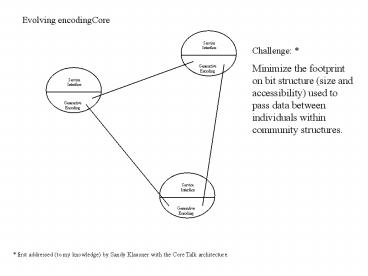Evolving encodingCore - PowerPoint PPT Presentation
Title:
Evolving encodingCore
Description:
Minimize the footprint on bit structure (size and accessibility) used to pass ... Applied Semiotics and esoteric physics community on the nature of transient ... – PowerPoint PPT presentation
Number of Views:33
Avg rating:3.0/5.0
Title: Evolving encodingCore
1
Evolving encodingCore
Challenge Minimize the footprint on bit
structure (size and accessibility) used to pass
data between individuals within community
structures.
first addressed (to my knowledge) by Sandy
Klausner with the Core Talk architecture.
2
Challenge Minimize the footprint on bit
structure (size and accessibility) used to pass
data between individuals within community
structures.
- Two categories of issues arise
- First category is based on motivation, who are
software systems for programmer communities or
human being in general - Second category is based on the transient nature
of optimization of footprint.
The first category is made more difficult to deal
with in spite of agreement that there is a
problem with professional interests rising over
general (broad based) interests of all human
beings to live in a world with higher average
standards of living and more broad based sharing
of responsibility and rewards.
3
Challenge Minimize the footprint on bit
structure (size and accessibility) used to pass
data between individuals within community
structures.
Core principled insight of the second
school There is a transient nature to the
optimization of computational structure.
The first school does not acknowledge this
principle, in spite of good evidence, thus
compounding the problem of professional
interests since not recognizing the transient
nature of information structure means that
problems contracted to address can be contracted
over and over due to the confusion in the minds
of contractors and the public.
4
Challenge Minimize the footprint on bit
structure (size and accessibility) used to pass
data between individuals within community
structures.
Evolving encodingCore
The second school principle of transience of
optimal information structure means that optimal
footprints are optimal only during some type of
demarcation depending on context. Context is
structured by reality even if the reality is
encoded as abstract structure in video/audio
digital objects.
principle of transience of optimal information
structure
5
Principle of transient of optimal information
structure
- Notes
- PCH (Process Compartment Hypothesis) was
developed to summarize the work I was seeing
(1994-95) from the Soviet Applied Semiotics and
esoteric physics community on the nature of
transient phase coherence in persistent objects.
The ground work is in physics and biology, but
has immediate application to computational
systems. - The PCH is the grounding science for the
computational architecture called the tri-level
architecture - The key to understanding both PCH and tri-level
is to assert, as we do in the second school, that
substrate materials aggregates together to form
the material for a compartment, but that the
compartment itself is shaped by the affordance
structure in the moment that the compartment
forms. Implication is that each context has
structure that is manifest as patterns in any
product from that context, including recording of
video/audio. - If one thinks about this just a bit, it is
realized that a given a class of digital objects
(ie produced using specific types of
technologies) the class is in fact a Process
Compartment). Once the compartment forms, there
is a unique nature to the digital object to be
encoded if we are talking only about the
generative Encapsulated Digital Object (gEDO).































